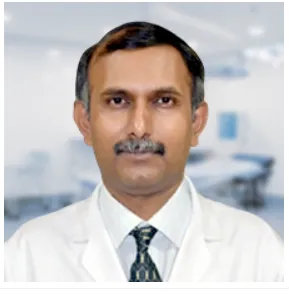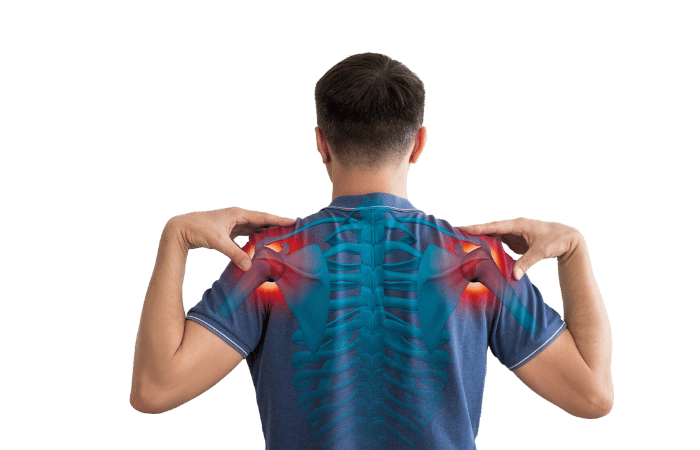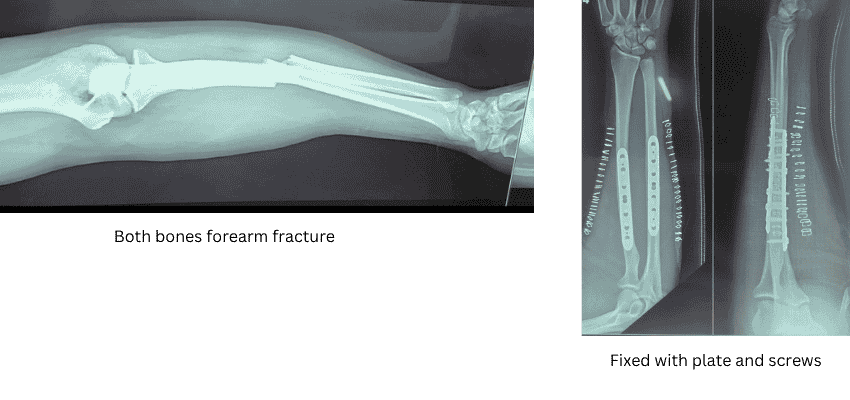Shoulder Surgery in Bangalore
Make Your Appointment!

Dr. Sandeep Subbaiah
Joint Replacement & Orthopedic Surgeon
What is Shoulder Surgery?
Shoulder surgery refers to various surgical procedures designed to repair injuries or conditions affecting this joint, which is one of the most flexible and mobile joints in the body. Shoulder Surgery in Bangalore encompasses minimally invasive techniques such as arthroscopy as well as traditional open surgeries to treat a wide range of shoulder issues.

Conditions commonly addressed through this surgery include rotator cuff tears, shoulder dislocation, impingement syndrome, and osteoarthritis. With advancements in surgical techniques, patients can expect faster recovery times and improved outcomes when undergoing shoulder surgery in the care of a skilled Orthopedic Surgeon.
When is Shoulder Surgery Necessary?
this surgery becomes necessary when non-surgical treatments like physical therapy, medications, or injections fail to provide relief. Common conditions that may require shoulder surgery include:
- Rotator cuff injuries: Tears or damage to the tendons in the rotator cuff, causing pain and weakness.
- Shoulder impingement syndrome: When the tendons of the rotator cuff are compressed.
- Shoulder dislocation or instability: Frequent dislocations or looseness in the shoulder joint.
- Frozen shoulder: Stiffness and pain that limit the shoulder’s range of motion.
Shoulder Surgery in Bangalore offers patients effective solutions for these conditions, allowing them to regain mobility and reduce pain. Consulting a Joint Replacement Surgeon or an experienced Orthopedic Surgeon like Dr. Sandeep Subbaiah is critical to determining the best treatment plan.
Symptoms That May Require Shoulder Surgery
Shoulder surgery is often recommended when conservative treatments such as physical therapy, medications, or injections have failed. Symptoms that may lead to surgery include:
- Chronic Shoulder Pain: Persistent pain that does not improve with rest or medication.
- Limited Range of Motion: Difficulty in moving the arm or shoulder, especially during overhead activities.
- Weakness in the Shoulder: Feeling of weakness or instability when lifting or moving the arm.
- Grinding or Clicking Sensation: A grinding or clicking sensation when moving the shoulder.
- Frequent Dislocations: Repeated shoulder dislocations or instability, especially during physical activities.
Risk Factors for Shoulder Injuries
Certain factors increase the risk of developing this problems, including:
- Age: Wear and tear due to aging can lead to conditions like rotator cuff tears or arthritis.
- Sports Activities: High-impact sports or repetitive overhead motions can result in shoulder injuries.
- Occupation: Jobs requiring frequent lifting or overhead movement may contribute to shoulder problems.
- Previous Injuries: A history of shoulder dislocations or fractures increases the risk of recurring problems.
Types of Shoulder Surgery
There are different types of shoulder surgeries based on the condition and severity of the injury:
Rotator Cuff Repair: This surgery is performed to repair torn tendons in the rotator cuff, a group of muscles and tendons stabilizing the shoulder.
Shoulder Arthroscopy: A minimally invasive procedure used to diagnose and treat various shoulder conditions such as rotator cuff tears, labral tears, and impingement.
Shoulder Replacement (Arthroplasty): This involves replacing the damaged parts of the shoulder joint with artificial implants. It is commonly performed for severe arthritis or after significant injury.
SLAP Tear Repair: This surgery is performed to repair tears in the Superior Labrum, a ring of cartilage around the shoulder socket, often caused by injury or overuse.
Bankart Repair: Used to treat shoulder instability or frequent dislocations, this procedure involves repairing the labrum and ligaments in the shoulder.
Patients undergoing Shoulder Surgery in Bangalore benefit from advanced surgical technologies and expert care from renowned surgeons like Dr. Sandeep Subbaiah, ensuring faster recovery and optimal results.
What is the Recovery Time After Shoulder Surgery?
Recovery after this surgery varies depending on the type of procedure performed. Minimally invasive surgeries like arthroscopy typically have a shorter recovery time, with patients able to resume daily activities within a few weeks. More extensive surgeries, such as Total Shoulder Replacement, may require a longer rehabilitation period lasting several months. Physical therapy plays a crucial role in recovery, helping patients restore strength and flexibility in the shoulder joint.
For those seeking Shoulder Surgery in Bangalore, consulting with a leading Orthopedic Surgeon like Dr. Sandeep Subbaiah ensures a comprehensive rehabilitation plan to support a successful recovery. Patients can expect significant pain relief and improved shoulder mobility with proper post-surgical care.
Risks and Complications of Shoulder Surgery
While Shoulder Surgery is generally safe, it is important to be aware of potential risks, which may include:
- Infection
- Nerve or blood vessel damage
- Shoulder stiffness
- Blood clots
- Implant wear or loosening (in cases of shoulder replacement)
By choosing an experienced Joint Replacement Surgeon like Dr. Sandeep Subbaiah, patients can minimize these risks and achieve the best possible outcomes.
Why Choose Shoulder Surgery in Bangalore?
Bangalore is home to highly qualified and experienced Orthopedic Surgeons specializing in shoulder surgeries. With advanced medical facilities and the latest surgical techniques, patients seeking Shoulder Surgery in Bangalore can expect world-class care. Surgeons like Dr. Sandeep Subbaiah offer personalized treatment plans to ensure that patients receive the most effective surgical care tailored to their specific needs.
Healing of Forearm Fracture Fixed with Plate and Screws

